八年级上册牛津英语1-4单元知识点及练习
- 格式:doc
- 大小:293.50 KB
- 文档页数:27
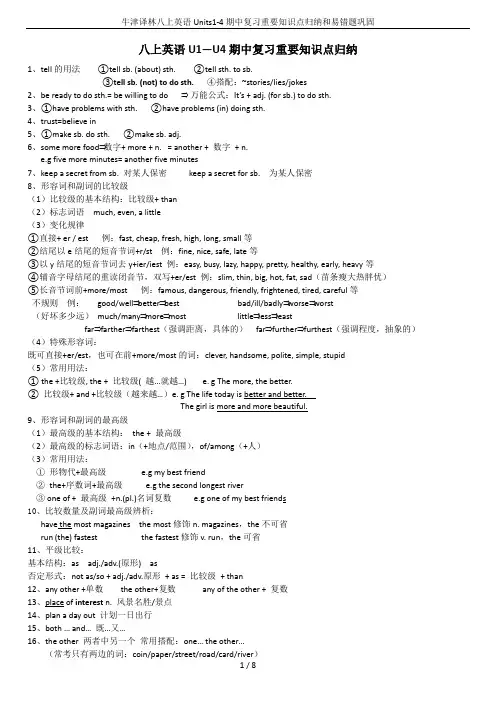
八上英语U1―U4期中复习重要知识点归纳1、tell的用法①tell sb. (about) sth. ②tell sth. to sb.③tell sb. (not) to do sth. ④搭配:~stories/lies/jokes2、be ready to do sth.= be willing to do ⇒万能公式:It’s + adj. (for sb.) to do sth.3、①have problems with sth. ②have problems (in) doing sth.4、trust=believe in5、①make sb. do sth. ②make sb. adj.6、some more food⇒数字+ more + n. = another + 数字+ n.e.g five more minutes= another five minutes7、keep a secret from sb. 对某人保密keep a secret for sb. 为某人保密8、形容词和副词的比较级(1)比较级的基本结构:比较级+ than(2)标志词语much, even, a little(3)变化规律①直接+ er / est 例:fast, cheap, fresh, high, long, small等②结尾以e结尾的短音节词+r/st 例:fine, nice, safe, late等③以y结尾的短音节词去y+ier/iest 例:easy, busy, lazy, happy, pretty, healthy, early, heavy等④辅音字母结尾的重读闭音节,双写+er/est 例:slim, thin, big, hot, fat, sad(苗条瘦大热胖忧)⑤长音节词前+more/most 例:famous, dangerous, friendly, frightened, tired, careful等不规则例:good/well⇒better⇒best bad/ill/badly⇒worse⇒worst(好坏多少远)much/many⇒more⇒most little⇒less⇒leastfar⇒ farther⇒ farthest(强调距离,具体的)far⇒ further⇒ furthest(强调程度,抽象的)(4)特殊形容词:既可直接+er/est,也可在前+more/most的词:clever, handsome, polite, simple, stupid(5)常用用法:① the +比较级, the + 比较级( 越…就越…) e. g The more, the better.② 比较级+ and +比较级(越来越…)e. g The life today is better and better.The girl is more and more beautiful.9、形容词和副词的最高级(1)最高级的基本结构:the + 最高级(2)最高级的标志词语:in(+地点/范围),of/among(+人)(3)常用用法:① 形物代+最高级 e.g my best friend② the+序数词+最高级 e.g the second longest river③ one of + 最高级+n.(pl.)名词复数 e.g one of my best friends10、比较数量及副词最高级辨析:have the most magazines the most修饰n. magazines,the不可省run (the) fastest the fastest修饰v. run,the可省11、平级比较:基本结构:as adj./adv.(原形) as否定形式:not as/so + adj./adv.原形+ as = 比较级+ than12、any other +单数the other+复数any of the other + 复数13、place of interest n. 风景名胜/景点14、plan a day out 计划一日出行15、both … and…既…又…16、the other 两者中另一个常用搭配:one… the other…(常考只有两边的词:coin/paper/street/road/card/river)other + n. 名词= othersanother 泛指三者及以上的另一个17、why not do sth.= why don't sb. do sth.18、动词v. like⇒dislike 介词prep. like⇒unlike19、can't wait to do sth. 迫不及待做某事wait for sth./sb 等待…20、① seem to do sth. ② seem + adj.21、in the end = at last = finally22、discuss (sth.) with sb. discuss+特殊疑问词+to do sth.23、offer sb. sth = offer sth. to sb. offer to do sth.24、near the end of... 在......快结束时at the end of…在…结束时25、have+时间+off 放多长时间的假 e.g have eight days off26、后缀ly:① adj.+ ly = adv.例:real⇒really bad⇒badly usual⇒usually careful⇒carefullypossible⇒possibly terrible⇒terribly(以ble结尾的去e+y)特殊词:polite⇒ politely complete(adj.完整的,完全的)⇒ completely② n. + ly= adj.例:day⇒daily(以y结尾的去y+ ily)week⇒weekly friend⇒friendly month⇒monthly year⇒yearly等27、finish doing sth. 完成做某事28、choose (sb.) to do sth.29、need(s) to do sth.(need为实义动词)need do sth.(need为情态动词)30、search A for B:在A处搜索B31、下小轿车get out of 下公交车get off get off it32、be interested in sth.= show interest in sth.33、①invite sb. to do sth. ②invite sb. to some place34、join in=take part in +活动join=be a member of +组织/团体,如the Party35、bor ing表示令人无聊的bor ed表示感到无聊36、arrive in/at= get to = reach 只有arrive可以不接宾语表示“到达”37、当主宾一致时,可用反身代词,例:enjoy oneself, take care of oneself, wash oneself, hurt oneself, dress oneself, teach oneself ,help oneself (to +食物)(自便/自取食物), for oneself(亲自)38、get to the final of= be in the final of 进入决赛39、表示建议的语句:Shall we…? Let's… What/How about doing ? Why not …? Why don't we…? Would you like to do…? Would you please(not) do…?40、后缀-ful(意为full of) and –less(意为without) 注意:没有endful,noiseful endless无穷无尽的tasteful有滋有味的tasteless 乏味的41、plan to do sth. 计划做某事(过去式:planned;现在分词:planning)42、instead of (doing)sth. 代替43、stand for 代表44、pay sb.+(money)to do sth. pay(money)for sth45、you'd better(not)do sth.46、be crazy about doing sth.47、look/feel/touch/taste/sound/smell + adj.48、once+过去式49、keep(on)doing sth.50、stop doing sth.(停止正在做的事)stop to do sth.(停止去做某事)51、not only... but also... 就近原则例:Not only you, but also he likes DIY.52、advise sb.(not)to do sth. 建议(不)做某事advice 不可数:a piece of advice 一则建议53、sb. spend(s)+ time/money+(in)doing sth. /on sth.题中常与practise一起出现: spend time practise doing sth.54、有关put的词组词义辨析put up (a tent/a picture) 搭建/张贴put in (a light) 安装put out (a fire) 扑灭put on (a coat) 穿上put off (a coat/a school trip) 脱下/推迟55、fill A with B 用B充满A be full of=be filled with56、fail to do sth. 失败做某事57、祈使句+and/or+将来时e.g Hurry up, or you will be late.58、祈使句的反义疑问句:除了Let's用shall we外,其余都用will you59、give up doing sth. 放弃做某事60、cut out 剪出cut down (the trees) 砍伐cut … into… 把…剪成…61、turn+颜色62、否定前缀un-, in-,im-:①un-: uncertain,uncomfortable,unimportant,uninteresting,unpopular,unpleasant等②in-: inactive, incorrect, incomplete, indirect等③im-: impatient, impossible, impolite, improper等④特殊dis-: dishonest63、add A to B put A on B64、have fun/enjoy oneself/have a great time + doing sth.65、by oneself= alone= on one's own= oneself66、decide (not) to do sth.67、something ①做主语时当三单②……to do ③……+adj.68、advise doing sth.69、the number of+动词三单 a number of...( =many) +复数70、keep it secret⇒ keep sb./sth. adj. 过去式:kept易错题巩固选择( )1 Is Suzhou bigger than _____ in Jiangsu and bigger than ______ in China?A any city ; any cityB any city ; any other cityC any other city; the other citiesD any other city; any city ( )2 -----Can _____ lies make your friends happy sometimes?------Yes. Sometimes it is better _____ a white lie than ______ someone a painful(痛苦的) truth.A telling; to tell; tellingB tell; to tell; to tellC telling ; to tell; to tellD tell; tell; tell( )3 -----Is your Maths better than ______? -------Yes. I work harder at it than _____, you know.A Kate; herB K ate’s; herC Kate; sheD Kate’s ; hers( )4 I think the cost of the trip is very ______ , and the ticket is very _____.A expensive; highB expensive; expensiveC high; highD high ; expensive( )5 _______ important news report it is!A WhatB What aC What anD How( )6 -----When will you return ______? ------Next Monday.A to homeB back homeC back to homeD home( )7 -----If you are free tonight, how about having dinner together? ------_______________.A It doesn’t matter.B That’s all right.C All right.D Not at all.( )8 ---Are you willing to live on Mars(火星)one day? ------________. It sounds exciting, but it still worries me.A Of course I am.B Are you joking?C Why not?D I’m not sure.( )9 Don’t forget ________ off the lights when you leave the room.’A to putB puttingC to turnD turning( )10 When you ___________ there, you can call me .A get toB arrive atC reachD arrive( )11 -----________ I take the magazine away? ------No, you mustn’t. You ______ read it only there.A Must, canB May , canC Need ; mustD Must; must( )12 When he walks ______ my desk, he often knocks my books _____ the table.A past; offB past ; ontoC through ; onD across ; away( )13 This question is ______ more difficult than that one.A soB quiteC a littleD very( )14 In order to find ______ better job, she planned to learn ______ second foreign language.A the; aB a;aC the;theD a;the( )15 ---Did John get Number 1 in the writing competition? ------ Yes, no one did as ______ as him.A goodB wellC betterD best( )16 The number of the students in Zhengheng Middle School _____ than ______ in Sunshine Middle School.A is larger; thoseB is larger; thatC are lager; thatD are more; those( )17 Ann’s house is ten miles away from the school and nobody else in her class lives _________.A farB fartherC farthestD the furthest( )18 I didn’t know which T-shirt was _________, so I took them both.A nicerB wellC bestD good( )19 ________ all the animals, my pet dog is the ________ to me.A To; cleverestB Of ; cleverestC In; cleverestD Of; most clever( )20 There is a big cake here. ________ share it.A May be we canB We may beC Maybe we canD Maybe can we( )21 Nanjing is famous _______ an old city _______ a long history.A for; hasB as; hasC for; withD as; with( )22 His composition is _______ better than mine, I think.A moreB veryC a lot ofD much( )23 ----Who did more book, Bill or Henry? ----- I think Bill did just _________ Hery.A as more asB as many asC as much asD as most as( )24 ----Tom, what are you doing? ------- I’m checking my homework to ____________ there are fewer mistakes.A look forB find outC make sureD find( )25 Tom always wants to ______ others. They say they want to be themselves.A be different fromB be the same asC be different fromD be the same with( )26 -----____ your father like F1? ---He is fond of it. But my mother ______ like him. She likes Korea Dramas.A Is ; isn’tB Does ; isn’tC Is ; doesn’tD Does; is( )27 Bob skates ___________ than I, but he doesn’t skate __________ Daniel.A better; as good asB better; so good asC better; as well asD much well; as well as( )28 _____ this kind of fruit salad, and you will like it .A To tryB TryingC TryD Tried( )29 Everyone became very sad when the bad news ____________.A gotB reachedC arrivedD arrived at( )30 ----Don’t forget to wear school uniforms on Monday morning. ------_____________________.A Yes, I willB No, I will.C OK, I won’t.D Yes, I won’t.( )31 Miss Gao asked a question, but it was _______ that nobody could answer it.A very difficultB too difficultC difficult enoughD so difficult( )32 ---Do you mind my opening the door? -----__________.A Yes, please do.B No, please d on’t.C I don’t know.D Of course not.( )33 ----_______? ---He is tall and handsome.A What does he look like?B What is he look?C What is he like?D What does he like?( )34 Hurry up! There is _______ time left.A littleB a littleC a fewD few( )35 ----I saw John in the park this morning. -----It _______ be him. He has gone to Hongkong.A can’tB canC mustn’tD must( )36 -----I’m so hungry. Can I have _______?--------Of course. How about a piece of cake?A anything to eatB something to eatC anything eatD something eat( )37 I have _______ money than him, but he has ______ friends than me.A fewer; lessB less; fewerC more; lessD less; more( )38 David is taller than ______ in his class.A any studentB the studentsC any studentsD the other students( )39 -----____________ QQ chatting? ------Wonderful! It’s like ________ with a real person in front of you.A What do you think of; to chatB How do you find; chattingC What do you liking ; chattingD How do you think of ; to chat( )40 We have two hours _________ homework every day and a monthly test _____ each subject.A of; onB on; ofC for; onD for ;about( )41 The number of the ______ teachers in our school is becoming _________.A men;fewer and fewerB man;more and moreC man; larger and largerD men ; smaller and smaller ( )42 Why not stop ____ with us at_____ lunchtime? You need to have a rest! All work and no play makes Jack a dull boy.A to chat; /B chatting ; theC to chat; theD chatting; /( )43 Jim enjoyed himself at the party. He looked as __________ as a king!A happyB happilyC happierD more happily( )44 –Will you have a trip to Taiwan during the golden week?--No. The cost will be much ______ than usual then. I plan to go there in November.A higherB more expensiveC expensiveD high( )45 The food in Nanjing is not as hot as ___________ in Chengdu. But it’s nice too.A thoseB thisC itD that( )46 ---Where are you now. Tom? We are all waiting for you. ---I am _______ soon. I am only one stop away.A gettingB arrivingC reachingD leaving( )47 ---How long can I ____________ the library book? ----Two weeks. And please take good care of it.A borrowB returnC keepD take( )48 Granny Lee lives in the flat ____________ and the students’ visits make her feel better.A with herselfB on the ownC by herselfD about herself( )49 ------________ I take the magazine away? -------No, you mustn’t. You _____ read it only here.A Must; canB May ; canC Need; mustD Must; must( )50 -----We tried our best, but we lost the table tennis match. ------____________.A I’m afraid not.B That’s Ok.C What a pity!D Nothing.( )51 ----The bus has stopped. Let’s _____.-----OK, take care not to fall to the ground.A get on itB get off itC get it onD get it off( )52 Millie planned to learn ______ third language in order to find _____ better job some day.A the; aB a;aC the; theD a; the( )53 My cousin would like to visit you new house _______ next week.A sometimesB some timeC sometimeD some times( )54 I really want to stay at home _____ sunny days _____ going out alone.A on; insteadB in; instead ofC at; insteadD on; instead of( )55 Help the old lady to clean up her bedroom, _________?A do youB don’t youC will youD aren’t you( )56 This month, a boy from the remote area returned ____ iPhone X without asking for a reward. So a reporter wrote _____ 1800-word article to praise this behaviour.A a; anB an; aC the ; aD an; an( )57 Although she acted in ____ films than the other actresses, Dilraba becomes a __ actress after working hard for years.A more; trueB fewer; realC fewer; trueD more; real( )58 If we go on polluting the world, it will be no longer ______ us to ______ at last.A fit; liveB fit; live inC fit for ; liveD fit for; live in( )59 ---Could you look after my baby while I’m away. --------____________.A With pleasure.B That’s all right.C That’s right.D It doesn’t matter.( )60 The trip from the school to the Great Wall _______ about half an hour by taxi.A spendsB costsC paysD takes( )61 ----The box is too heavy to carry. What’s in it? ----Oh, I ______ it ______ books.A filled, withB am full; ofC am filled; withD filled of用所给词的适当形式填空1 How kind you are! You always do what you can __________(help)me.2 She didn’t tell her secrets to others.(同义句)She ______ her secrets to _________.3 I have a ___________ (真正的)friend. He always helps me a lot.4 I don’t know what her interests are, because we talk _________(主要地)about work when we meet.5 The road is only one track ________(wide).6 _______(final), I saw the daylight again.7 This subject has no __________ (interest) to me.8 We learnt a lot about different ______________(cultural).9 I don’t think that’s a good idea.(反意疑问句) I don’t think that’s a good idea, ________ ____________?10 It kept raining a lot and then the flood(洪水) happened. It was the ________(糟糕)weather we had last year.11 Students usually search online for ________ (far) information.12 The number of Tibetan antelopes(藏羚羊) is even __________ (少) now. We’d better try out best to protect them.13 The doctor says ____________ (practise) __________(play) badminton can make us healthier.14 She has the most expensive bike in her class. (改同义句)__________ ____________ bike is more expensive than _________ in her class.15 The ticket cost him 36 yuan. (改同义句) He _______ 36 yuan _______ the ticket.16 How is your National Day? (同义句转换) __________ your National Day ____________?17 The earth _______________ (become) warmer and warmer. This is a real problem.18 What foreign languages ________ you _________ (learn) except English?19 Alice is ________________ of the two girls. (beautiful)20 Wang Gang is ________________(healthy) student in my class.21 Which is ________(close) to the sun, the earth or the moon?22 Saturday is my __________(busy) day in a week.23 Mr Lee feels _________ (joy) every day.24 Jim is the __________ (tall) one of the twin brothers.25 Role-play is __________-(help) in developing English speaking.26 This book is as __________(interest) as the one on the desk.27 Millie’s drawing is better than the other five.(同义句转换)Millie’s drawing is ___________ ______________ _______________ _____________ the ________________.28 Ann has 30 books. Kate has 40 books.(同义句转换) Kate ________ __________ _________ ______________ Ann.29 Jack and Tom were born in the same year.( 同义句转换) Jack is _______ ____________ __________ Tom.30 Yesterday something ______________ (usual) happened, we all surprised.31 He jumps the ___________(远) of all the boys in his school.32 Andy always tells lies, so a___________ no one in his class likes him.33 S_______ snacks can give us energy, but you shouldn’t eat too many.34 I’m 1.70 metres in _____________ , but I’m still shorter than my brother.35 We are pound(自豪) of the ____________ of our motherland.36 He often ___________(believe that sb. Is good and honest ) others ,so he has many good friends.37 Excuse me, Lily. What’s the __________(long ) of the Changjiang River, do you know?38 When you have the _______(选择)of being right or being kind , choose kind.39 It’s ________(high) possible that humans have to move to Mars in the future.40 How _______ (幸运的) they are to have such a good teacher!41 A long time ago it was __________(广泛地) believed that there was life on Mars.42 When something __________(worry) her, she always goes to her friends.43 Please write down the names of the _______________(foreign). We need to prepare lunch for them.44 A car suddenly hit the poor old man while he __________(cross) the street.45 Practice makes perfect. We should practice as hard as we can _____________(learn) English well.46 Be careful ________________(not knock) anything off the desk when you walk past.47 When we reading something, it is sometimes hard for us to understand the true _________(mean) behind the lines.48 My parents seldom buy _________________(they ) expensive clothes.49 The uniform ________(fit) her perfectly last year, but it is too small for her now.50 We hear that many students of ___________(we) will help do a bird count.51 It’s a lot _________ (win d) today than yesterday.52 She looked me ___________(straight) in the eye and told me the truth.53 The new bridge is 1000 metres wide.(改同义句)______ ________ is the new bridge? ===_______ is the ________ __________ the new bridge?54 What about going for a picnic this weekend? (改为同义句)___________ __________ ___________ go for a picnic this weekend?55 I don’t think the trip is wonderful.(改成反意疑问句) I don’t think the trip is wonderful, _________ _________?56 Do you have any free time ____________(help) me with the housework?57 There are a number of _________(味道好) fruits in the market.翻译1 这部电脑是商店中最贵的。
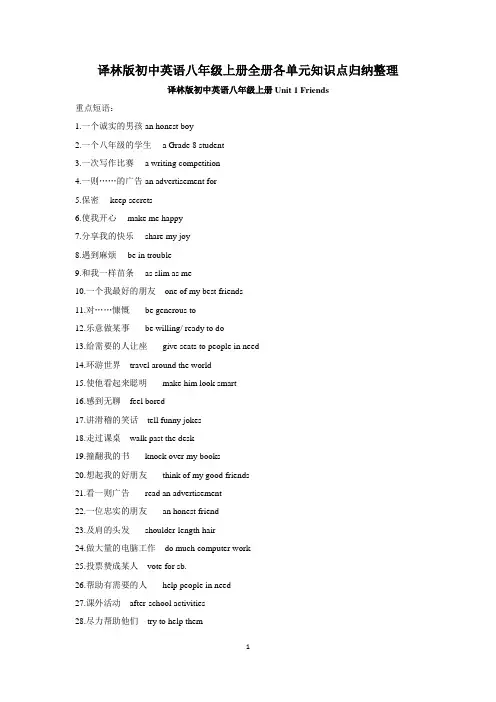
译林版初中英语八年级上册全册各单元知识点归纳整理译林版初中英语八年级上册Unit 1 Friends重点短语:1.一个诚实的男孩 an honest boy2.一个八年级的学生 a Grade 8 student3.一次写作比赛 a writing competition4.一则……的广告 an advertisement for5.保密keep secrets6.使我开心make me happy7.分享我的快乐share my joy8.遇到麻烦be in trouble9.和我一样苗条as slim as me10.一个我最好的朋友one of my best friends11.对……慷慨be generous to12.乐意做某事be willing/ ready to do13.给需要的人让座give seats to people in need14.环游世界travel around the world15.使他看起来聪明make him look smart16.感到无聊feel bored17.讲滑稽的笑话tell funny jokes18.走过课桌walk past the desk19.撞翻我的书knock over my books20.想起我的好朋友think of my good friends21.看一则广告read an advertisement22.一位忠实的朋友an honest friend23.及肩的头发shoulder-length hair24.做大量的电脑工作do much computer work25.投票赞成某人vote for sb.26.帮助有需要的人help people in need27.课外活动after-school activities28.尽力帮助他们try to help them29.一名社会工作者 a social worker30.未来计划future plans31.看起来爱好运动look sporty32.搬迁到北京move to Beijng33.过来come over34.想念我的老同学miss my old classmates35.与……交朋友make friends with36.给我一些忠告give my some advice37.住在隔壁live next door38.邀请某人做某事invite sb to do39.她微笑的眼睛her smiling eyes40.面带微笑wear a smile on one’s face41.再来一些饮料some more drinks42.一些喝的something to drink43.任何时间at any time44.在将来in the future45.对……很了解know sth. very well46.一个人坐着sit alone47.认识某人get to know sb.48.不如not as… as49.在做某事上有困难have problems doing sth.50.在某事上有困难have problems with sth.51.适合某事be suitable for52.和某人分享某物share sth with sb53.对某人友好be friendly to sb54.十年前ten years ago55.解出数学题solve the maths problem56.写信给某人write to sb57.说某人的坏话say a bad word about sb58.相信他说的话believe what he said/ his words59.倾听人们的难题listen to people’s problems60.帮助人们解决难题help people solve their problems61.因为……而出名be famous for62.作为……而出名be famous as63.个像艾伦那样的朋友have a friend like Alan64.在午餐期间during lunch time65.同意做某事agree to do66.同意某人的意见agree with sb67.在左边的那个男孩the boy on the left68.跑步最快的人the fastest runner69.A和B都both A and B重点句型:1.冰箱里没有别的东西。
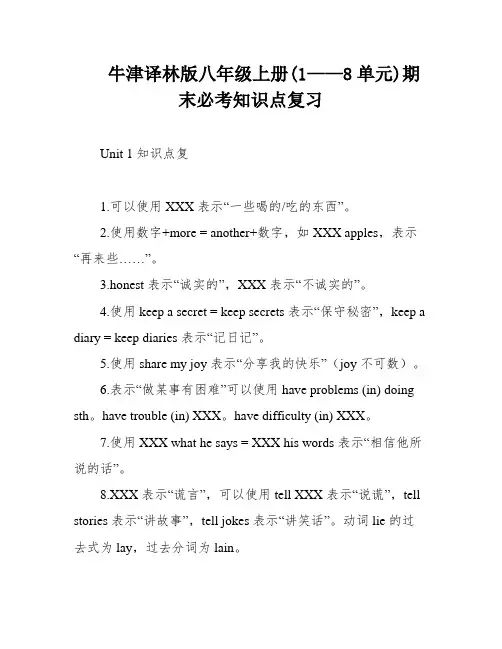
牛津译林版八年级上册(1——8单元)期末必考知识点复习Unit 1 知识点复1.可以使用 XXX 表示“一些喝的/吃的东西”。
2.使用数字+more = another+数字,如 XXX apples,表示“再来些……”。
3.honest 表示“诚实的”,XXX 表示“不诚实的”。
4.使用 keep a secret = keep secrets 表示“保守秘密”,keep a diary = keep diaries 表示“记日记”。
5.使用 share my joy 表示“分享我的快乐”(joy 不可数)。
6.表示“做某事有困难”可以使用 have problems (in) doing sth。
have trouble (in) XXX。
have difficulty (in) XXX。
7.使用 XXX what he says = XXX his words 表示“相信他所说的话”。
8.XXX 表示“谎言”,可以使用 tell XXX 表示“说谎”,tell stories 表示“讲故事”,tell jokes 表示“讲笑话”。
动词 lie 的过去式为 lay,过去分词为 lain。
9.interesting 修饰物,表示“令人感到有趣的”;interested修饰人,表示“对……感兴趣的”。
例如:That interesting old man came to our school every day.(那个有趣的老人天天到我们学校来。
)An XXX.(一位感兴趣的外国人来参观我们学校。
)This book is XXX.(这本书在我看来很有趣。
)I’m XXX book.(我对这本书很感兴趣。
)1) Good friends should not only be kind and supportive。
but also XXX。
2) Max is such an intriguing person.3) XXX is also one of the XXX class.4) My sister has short hair。
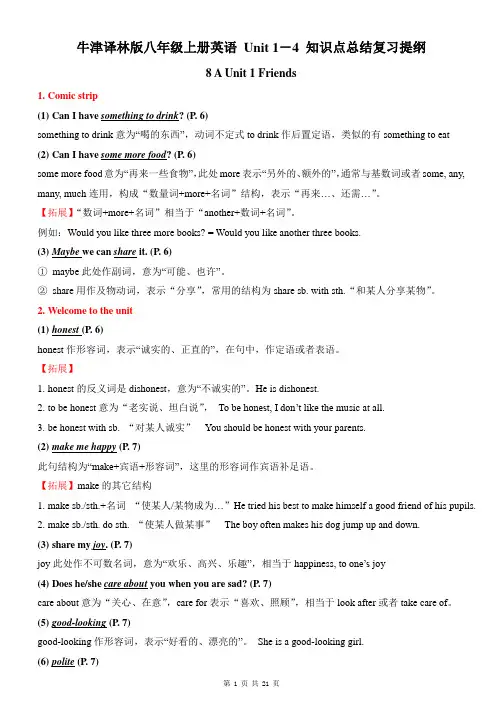
牛津译林版八年级上册英语Unit 1-4 知识点总结复习提纲8 A Unit 1 Friendsic strip(1)Can I have something to drink? (P. 6)something to drink意为“喝的东西”,动词不定式to drink作后置定语,类似的有something to eat (2)Can I have some more food? (P. 6)some more food意为“再来一些食物”,此处more表示“另外的、额外的”,通常与基数词或者some, any, many, much连用,构成“数量词+more+名词”结构,表示“再来…、还需…”。
【拓展】“数词+more+名词”相当于“another+数词+名词”。
例如:Would you like three more books? = Would you like another three books.(3)Maybe we can share it. (P. 6)①maybe此处作副词,意为“可能、也许”。
②share用作及物动词,表示“分享”,常用的结构为share sb. with sth.“和某人分享某物”。
2.Welcome to the unit(1)honest (P. 6)honest作形容词,表示“诚实的、正直的”,在句中,作定语或者表语。
【拓展】1.honest的反义词是dishonest,意为“不诚实的”。
He is dishonest.2.to be honest意为“老实说、坦白说”,To be honest, I don’t like the music at all.3.be honest with sb. “对某人诚实”You should be honest with your parents.(2)make me happy (P. 7)此句结构为“make+宾语+形容词”,这里的形容词作宾语补足语。
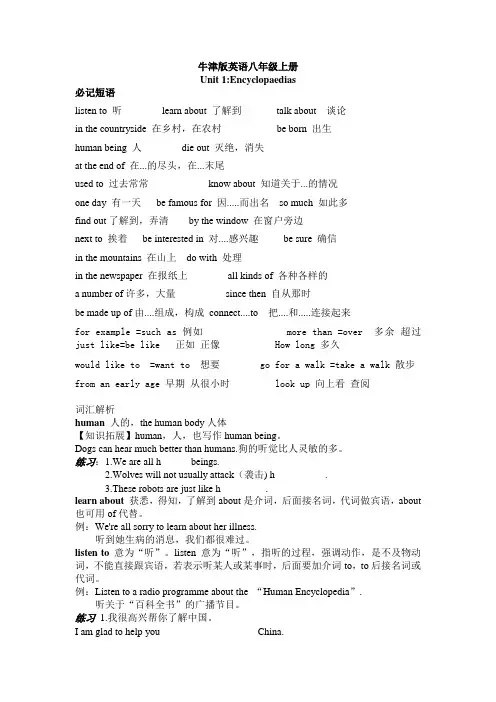
牛津版英语八年级上册Unit 1:Encyclopaedias必记短语listen to 听learn about 了解到talk about 谈论in the countryside 在乡村,在农村be born 出生human being 人die out 灭绝,消失at the end of 在...的尽头,在...末尾used to 过去常常know about 知道关于...的情况one day 有一天be famous for 因.....而出名so much 如此多find out了解到,弄清by the window 在窗户旁边next to 挨着be interested in 对....感兴趣be sure 确信in the mountains 在山上do with 处理in the newspaper 在报纸上all kinds of 各种各样的a number of许多,大量since then 自从那时be made up of由....组成,构成connect....to 把....和.....连接起来for example =such as 例如 more than =over 多余超过just like=be like 正如正像 How long 多久would like to =want to 想要 go for a walk =take a walk 散步from an early age 早期从很小时 look up 向上看查阅词汇解析human 人的,the human body人体【知识拓展】human,人,也写作human being。
Dogs can hear much better than humans.狗的听觉比人灵敏的多。
练习:1.We are all h______beings.2.Wolves will not usually attack(袭击) h__________.3.These robots are just like h_________.learn about 获悉,得知,了解到about是介词,后面接名词,代词做宾语,about 也可用of代替。
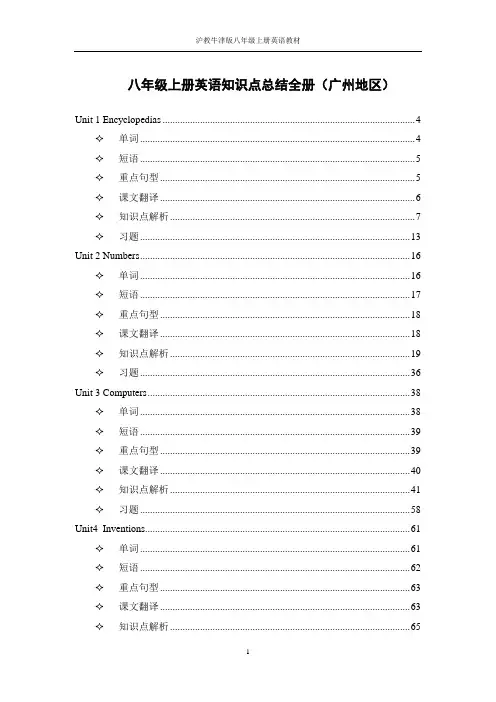
八年级上册英语知识点总结全册(广州地区)Unit 1 Encyclopedias (4)✧单词 (4)✧短语 (5)✧重点句型 (5)✧课文翻译 (6)✧知识点解析 (7)✧习题 (13)Unit 2 Numbers (16)✧单词 (16)✧短语 (17)✧重点句型 (18)✧课文翻译 (18)✧知识点解析 (19)✧习题 (36)Unit 3 Computers (38)✧单词 (38)✧短语 (39)✧重点句型 (39)✧课文翻译 (40)✧知识点解析 (41)✧习题 (58)Unit4 Inventions (61)✧单词 (61)✧短语 (62)✧重点句型 (63)✧课文翻译 (63)✧知识点解析 (65)✧习题 (68)Unit5 Educational exchange (71)✧单词 (71)✧短语 (72)✧重点句型 (72)✧课文翻译 (73)✧知识点解析 (74)✧习题 (83)Unit 6 Ancient stories (85)✧单词 (85)✧短语 (87)✧重点句型 (87)✧课文翻译 (88)✧知识点解析 (89)✧习题 (95)Unit 7 Memory (100)✧单词 (100)✧短语 (101)✧重点句型 (101)✧课文翻译 (102)✧知识点解析 (103)✧习题 (109)Unit 8 English Week (114)✧单词 (114)✧短语 (115)✧重点句型 (115)✧课文翻译 (116)✧知识点解析 (117)✧习题 (122)每单元必考语法点预览Unit 1 some与any的用法& 复合不定代词somebody, anybody, nobody等的用法Unit 2基数词及数字的表达& 序数词Unit 3形容词的比较级与最高级Unit 4 good, bad, far & (not) as…as…Unit 5现在完成时& already, yet, ever, neverUnit 6 现在完成时中since, for & 现在完成时与一般过去时的区别Unit 7(真实性)条件状语从句& if…not 与unlessUnit 8情态动词should, had betterUnit 1 Encyclopedias 单词suddenly adv. [ˈsʌdn:lɪ] 意外地,忽然地nobody pron. [ˈnoˌ bədi] 没有人,无人fossil n. [ˈfɑsəl] 化石win v [wɪn] 获胜,赢dollar n [ˈdɑlɚ] 美元✧短语1.in the countryside 在乡村,在农村11.for example 例如2.human being 人12.next to 紧挨着3.die out 灭绝,消失13.look up 查阅4.find out 了解,弄清14.live on Earth 生活在地球上5.go for a walk 去散步15.an Italian painter 一位意大利画家6.be born 出生ed to do sth 过去常常做某事7.more than 多于,超过17.at the end of 在…末尾8.just like 正如,正像18.in the centre 在中心9.how long 多久e out of…从…出来10.would like 想要20.be famous for 以…而闻名✧重点句型1.Some dinosaurs were as small as chickens. 有的恐龙和鸡一样小。
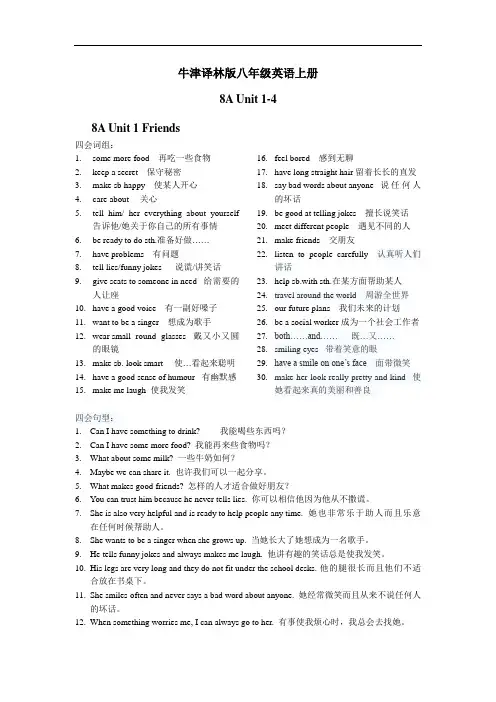
牛津译林版八年级英语上册8A Unit 1-48A Unit 1 Friends四会词组:1.some more food 再吃一些食物2.keep a secret 保守秘密3.make sb happy 使某人开心4.care about 关心5.tell him/ her everything about yourself告诉他/她关于你自己的所有事情6.be ready to do sth.准备好做……7.have problems 有问题8.tell lies/funny jokes 说谎/讲笑话9.give seats to someone in need 给需要的人让座10.have a good voice 有一副好嗓子11.want to be a singer 想成为歌手12.wear small round glasses 戴又小又圆的眼镜13.make sb. look smart 使…看起来聪明14.have a good sense of humour 有幽默感15.make me laugh 使我发笑16.feel bored 感到无聊17.have long straight hair留着长长的直发18.say bad words about anyone 说任何人的坏话19.be good at telling jokes 擅长说笑话20.meet different people 遇见不同的人21.make friends 交朋友22.listen to people carefully 认真听人们讲话23.help sb.with sth.在某方面帮助某人24.travel around the world 周游全世界25.our future plans 我们未来的计划26.be a social worker成为一个社会工作者27.both……and……既…又……28.smiling eyes 带着笑意的眼29.have a smile on one’s face面带微笑30.make her look really pretty and kind 使她看起来真的美丽和善良四会句型:1.Can I have something to drink? 我能喝些东西吗?2.Can I have some more food? 我能再来些食物吗?3.What about some milk? 一些牛奶如何?4.Maybe we can share it. 也许我们可以一起分享。
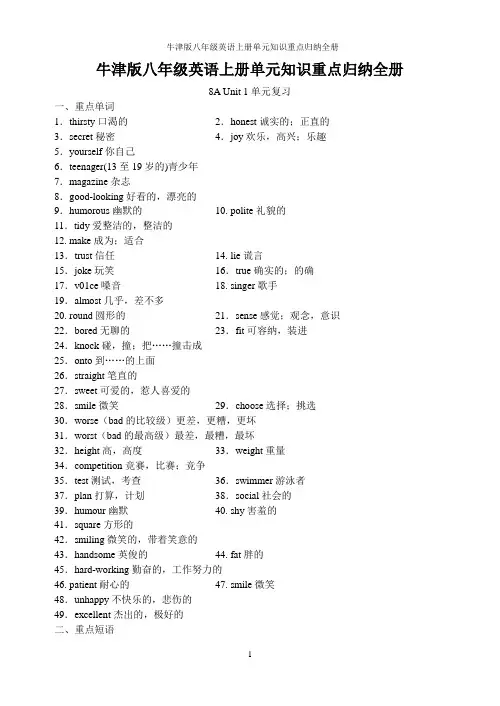
牛津版八年级英语上册单元知识重点归纳全册8A Unit 1单元复习一、重点单词1.thirsty口渴的2.honest诚实的;正直的3.secret秘密4.joy欢乐,高兴;乐趣5.yourself你自己6.teenager(13至19岁的)青少年7.magazine杂志8.good-looking好看的,漂亮的9.humorous幽默的10. polite礼貌的11.tidy爱整洁的,整洁的12. make成为;适合13.trust信任14. lie谎言15.joke玩笑16.true确实的;的确17.v01ce嗓音18. singer歌手19.almost几乎,差不多20. round圆形的21.sense感觉;观念,意识22.bored无聊的23.fit可容纳,装进24.knock碰,撞;把……撞击成25.onto到……的上面26.straight笔直的27.sweet可爱的,惹人喜爱的28.smile微笑29.choose选择;挑选30.worse(bad的比较级)更差,更糟,更坏31.worst(bad的最高级)最差,最糟,最坏32.height高,高度33.weight重量34.competition竞赛,比赛;竞争35.test测试,考查36.swimmer游泳者37.plan打算,计划38.social社会的39.humour幽默40. shy害羞的41.square方形的42.smiling微笑的,带着笑意的43.handsome英俊的44. fat胖的45.hard-working勤奋的,工作努力的46. patient耐心的47. smile微笑48.unhappy不快乐的,悲伤的49.excellent杰出的,极好的二、重点短语1.something to drink 一些喝的东西2.have some more food 再吃一些食物3.keep a secret保守秘密4.make me happy使我开心5.have problems有问题6.care about关心,关怀7.tell lies撒谎,说谎8.one of my best friends我最好的朋友之一9.be willing to do愿意做10.share things with sb.与某人分享东西11.any time(一anytime)在任何时候12.give her seat on the bus在公共汽车上让出她的座位13.someone in need某个需要帮助的人14.grow up长大,成人15.make him look smart使他看起来神气16.walk past经过,路过17.knock sth. onto把某物撞落在……上18.say a bad word about sb.说某人的坏话19.in the future在未来20. help people with their problems帮助人们解决问题21.social worker社会工作者22.works of art艺术品23. some day某一天24.smiling eyes笑眯眯的眼睛25.make an excellent teacher成为一名优秀的教师三、重点句子及点拨1.Can I have something to drink?我可以喝点东西吗?something to drink意为“一些喝的东西”,其中动词不定式to drink作后置定语,修饰不定代词something。
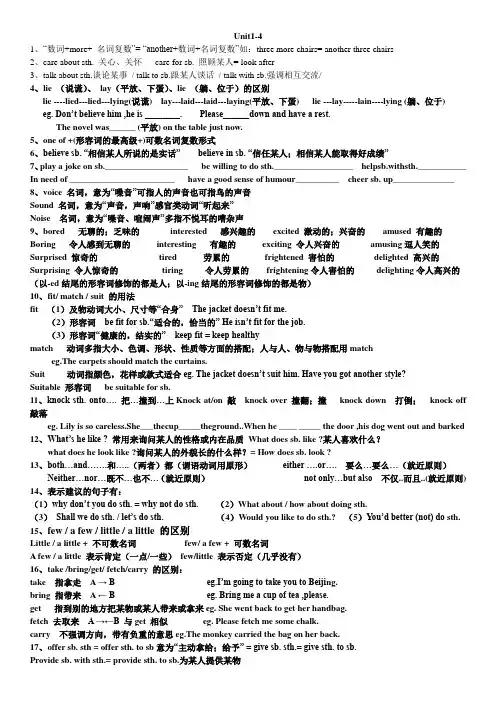
Unit1-41、“数词+more+ 名词复数”= “another+数词+名词复数”如:three more chairs= another three chairs2、care about sth. 关心、关怀care for sb. 照顾某人= look after3、talk about sth.谈论某事/ talk to sb.跟某人谈话/ talk with sb.强调相互交流/4、lie (说谎)、lay(平放、下蛋)、lie (躺、位于)的区别lie ----lied---lied---lying(说谎) lay---laid---laid---laying(平放、下蛋) lie ---lay-----lain----lying (躺、位于) eg. Don’t believe him ,he is ________. Please______down and have a rest.The novel was______ (平放) on the table just now.5、one of +(形容词的最高级+)可数名词复数形式6、believe sb. “相信某人所说的是实话” believe in sb. “信任某人;相信某人能取得好成绩”7、play a joke on sb.___________________ be willing to do sth.__________________ helpsb.withsth.___________ In need of ________________________ have a good sense of humour__________ cheer sb. up______________ 8、voice 名词,意为“嗓音”可指人的声音也可指鸟的声音Sound 名词,意为“声音,声响”感官类动词“听起来”Noise 名词,意为“噪音、喧闹声”多指不悦耳的嘈杂声9、bored 无聊的;乏味的interested 感兴趣的excited 激动的;兴奋的amused 有趣的Boring 令人感到无聊的interesting 有趣的exciting 令人兴奋的amusing逗人笑的Surprised 惊奇的tired 劳累的frightened 害怕的delighted 高兴的Surprising 令人惊奇的tiring 令人劳累的frightening令人害怕的delighting令人高兴的(以-ed结尾的形容词修饰的都是人;以-ing结尾的形容词修饰的都是物)10、fit/ match / suit 的用法fit (1)及物动词大小、尺寸等“合身” The jacket doesn’t fit me.(2)形容词be fit for sb.“适合的,恰当的” He isn’t fit for the job.(3)形容词“健康的,结实的” keep fit = keep healthymatch 动词多指大小、色调、形状、性质等方面的搭配;人与人、物与物搭配用matcheg.The carpets should match the curtains.Suit 动词指颜色,花样或款式适合eg. The jacket doesn’t suit him. Have you got another style?Suitable 形容词be suitable for sb.11、knock sth. onto…. 把…撞到…上Knock at/on 敲knock over 撞翻;撞knock down 打倒;knock off 敲落eg. Lily is so careless.She___thecup_____theground..When he ____ _____ the door ,his dog went out and barked 12、What’s he like ? 常用来询问某人的性格或内在品质What does sb. like ?某人喜欢什么?what does he look like ?询问某人的外貌长的什么样?= How does sb. look ?13、both…and…….和…..(两者)都(谓语动词用原形)either ….or…. 要么…要么…(就近原则)Neither…nor…既不…也不…(就近原则)not only…but also 不仅..而且..(就近原则) 14、表示建议的句子有:(1)why don’t you do sth. = why not do sth. (2)What about / how about doing sth.(3)Shall we do sth. / let’s do sth. (4)Would you like to do sth.? (5)Y ou’d better (not) do sth.15、few / a few / little / a little 的区别Little / a little + 不可数名词few/ a few + 可数名词A few / a little 表示肯定(一点/一些)few/little 表示否定(几乎没有)16、take /bring/get/ fetch/carry 的区别:take 指拿走 A → B eg.I’m going to take you to Beiji ng.bring 指带来 A ← B eg. Bring me a cup of tea ,please.get 指到别的地方把某物或某人带来或拿来eg. She went back to get her handbag.fetch 去取来 A →←B 与get 相似eg. Please fetch me some chalk.carry 不强调方向,带有负重的意思eg.The monkey carried the bag on her back.17、offer sb. sth = offer sth. to sb意为“主动拿给;给予” = give sb. sth.= give sth. to sb.Provide sb. with sth.= provide sth. to sb.为某人提供某物18、In the end = finally at the end of 在…的末尾near the end of 在…快结束时by the end of 到..末尾为止19、Win 及物动词指赢得比赛后面不可加人win the game / the basketball matchBeat 及物动词指打败后面跟人beat sb.20、a number of 与the number of 的区别:“a number of +复数名词”意为“许多”,作主语时,谓语动词用复数;“the number of +复数名词”意为“……的数目”,作主语时,谓语动词用单数。
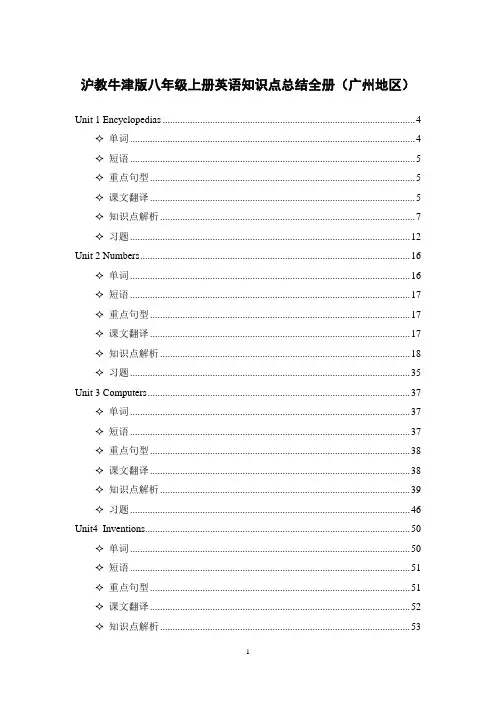
沪教牛津版八年级上册英语知识点总结全册(广州地区)Unit 1 Encyclopedias (4)✧ 单词 (4)✧ 短语 (5)✧ 重点句型 (5)✧ 课文翻译 (5)✧ 知识点解析 (7)✧ 习题 (12)Unit 2 Numbers (16)✧ 单词 (16)✧ 短语 (17)✧ 重点句型 (17)✧ 课文翻译 (17)✧ 知识点解析 (18)✧ 习题 (35)Unit 3 Computers (37)✧ 单词 (37)✧ 短语 (37)✧ 重点句型 (38)✧ 课文翻译 (38)✧ 知识点解析 (39)✧ 习题 (46)Unit4 Inventions (50)✧ 单词 (50)✧ 短语 (51)✧ 重点句型 (51)✧ 课文翻译 (52)✧ 知识点解析 (53)✧ 习题 (56)Unit5 Educational exchange (59)✧ 单词 (59)✧ 短语 (59)✧ 重点句型 (60)✧ 课文翻译 (61)✧ 知识点解析 (62)✧ 习题 (70)Unit 6 Ancient stories (73)✧ 单词 (73)✧ 短语 (74)✧ 重点句型 (74)✧ 课文翻译 (75)✧ 知识点解析 (76)✧ 习题 (81)Unit 7 Memory (86)✧ 单词 (86)✧ 短语 (87)✧ 重点句型 (88)✧ 课文翻译 (88)✧ 知识点解析 (89)✧ 习题 (96)Unit 8 English Week (100)✧ 单词 (100)✧ 短语 (101)✧ 重点句型 (101)✧ 课文翻译 (101)✧ 知识点解析 (103)✧ 习题 (107)每单元必考语法点预览Unit 1 some与any的用法& 复合不定代词somebody, anybody, nobody等的用法Unit 2基数词及数字的表达& 序数词Unit 3形容词的比较级与最高级Unit 4 good, bad, far & (not) as…as…Unit 5现在完成时& already, yet, ever, neverUnit 6 现在完成时中since, for & 现在完成时与一般过去时的区别Unit 7(真实性)条件状语从句& if…not 与unlessUnit 8情态动词should, had betterUnit 1 Encyclopedias 单词✧短语1.in the countryside 在乡村,在农村11.for example 例如2.human being 人12.next to 紧挨着3.die out 灭绝,消失13.look up 查阅4.find out 了解,弄清14.live on Earth 生活在地球上5.go for a walk 去散步15.an Italian painter 一位意大利画家6.be born 出生ed to do sth 过去常常做某事7.more than 多于,超过17.at the end of 在…末尾8.just like 正如,正像18.in the centre 在中心9.how long 多久e out of…从…出来10.would like 想要20.be famous for 以…而闻名✧重点句型1.Some dinosaurs were as small as chickens. 有的恐龙和鸡一样小。
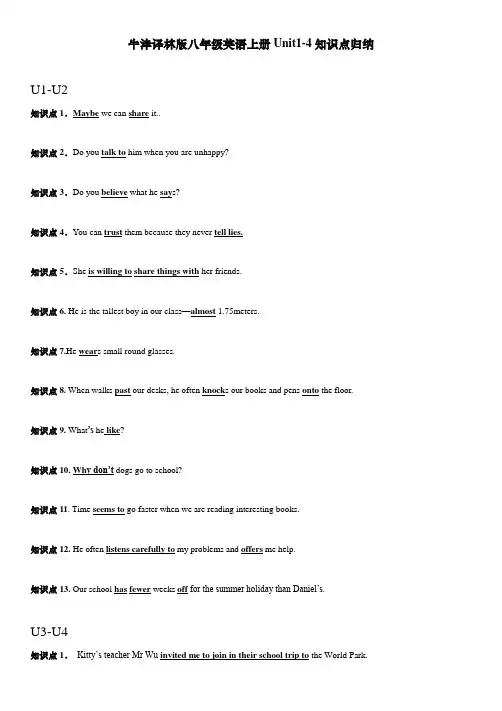
牛津译林版八年级英语上册Unit1-4知识点归纳U1-U2知识点1.Maybe we can share it..知识点2.Do you talk to him when you are unhappy?知识点3.Do you believe what he say s?知识点4.You can trust them because they never tell lies.知识点5.She is willing to share things with her friends.知识点6. He is the tallest boy in our class—almost 1.75meters.知识点7.He wear s small round glasses.知识点8. When walks past our desks, he often knock s our books and pens onto the floor.知识点9. What’s he like?知识点10. Wh y don’t dogs go to school?知识点11. Time seems to go faster when we are reading interesting books.知识点12. He often listens carefully to my problems and offers me help.知识点13. Our school has fewer weeks off for the summer holiday than Daniel’s.U3-U4知识点1.Kitty’s teacher Mr Wu invited me to join in their school trip to the World Park.知识点2. The trip from Kitty’s school took about two hours by coach.知识点3. Eiffel is made of metal and really tall.知识点4. Daniel taught himself how to make a home page.知识点5.Take a look at the things people (used in the past) and some old pictures in the Palace Museum. 知识点6.You need to exercise and keep fit.知识点7.I wonder where Simon is hiding.知识点8.Yesterday, I took a boat trip under the famous Harbour Bridge and went pas t the Opera House. 知识点9. Kitty and I felt sick for most of the trip.知识点10.When the coach stopped, we all got off quickly.知识点11.There are over a hundred places of interest from all over the world.知识点12. They were amazing, weren’t they ?知识点13.The whole world was there in front of us.知识点14.The match takes place at South Hill School in Moonlight Town on Sunday , 7th November.知识点15.We will make it a really fun day for everyone.知识点16.Thank you for agreeing to let me go on the trip today.知识点17.I also advised him to take a course in DIY.知识点18.Now the living room has not only blue walls but also a blue ceiling and floor.知识点19.Please don’t give up.知识点20.Lots of things went wrong during that time.知识点21. He once tried to put in a brighter light in his bedroom, but he made a mistake.知识点22. Another time, he wanted to put up a picture on his bedroom wall, but he hit a pipe and filled the room with water.知识点23. Some of the fruit will quickly turn brown when you leave it in the air for some time.知识点24. When you do DIY, you make, repair or decorate things yourself instead of paying someone to do it.一、单选1. —You never exercise? —_______. I walk for over an hour every day.A. No, I don’tB. Yes, I doC. Yes, I amD. No, I’m not2. We have a only sofa and a bed in our flat. We need to buy ______ furniture.A. littleB. manyC. fewD. much3. Bob skates ________ than I , but he doesn’t swim ________ IA. better; as well asB. better; so good asC. better; as good asD. much well; as well as4. —What do you think of children’s programmes on TV?—All are good _______, but it’s no t good to watch them too long.A. ItselfB. themselvesC. yourselvesD. ourselves5. —_______? —He is tall and strong.A. How does Simon likeB. Why does Simon likeC. What is Simon likeD. How does Simon look like6. Don’t forget to put the book back on the shelf, ________?强化练习A.do you B. don’t you C. will you D. won’t you7.Not only the parents but also their child _______ the secret.A. knowsB. knowC. don’t knowD. isn’t know8.—It’s a secret between us. Don’t tell others. —Sure,_______.A. doB. don’tC. willD. won’t9. There is ______ water, but there are quite ________empty glasses.A. little; a fewB. few; littleC. little; fewD. little; a little10.Things are ________ on Mars _______ on Earth because of the different gravity.A. much lighter; than onesB. much lighter; than thoseC. not so light; as thatD. not so light; as those11.From March 23rd, 2013, anyone under the age of 14______ go into Disney’s US parks alone.A. couldn’tB. mustn’tC.needn’tD. shouldn’t12.—______ is the height of Tom,Helen? —I’m not sure, but he is ______ than Simon.A. How much; higherB. How high; higherC. How tall; tallerD. What; taller13. We forgot to bring our tickets, please let us enter, _______?A. do youB. shall weC. will youD. don’t you14.Shanghai is bigger than ________ in Africa.A.any other cityB. any otherC.fewD.a few15.—National Day is coming. Let’s have a trip. —Shall we go ________?A.somewhere relaxedB.anywhere relaxedC.somewhere relaxingD. everywhere relaxing16.Lucy is good at dancing and Lily is good at it _______.A. alsoB.as wellC.eitherD.as well as17.Mr Brown knows ______ Japanese, so he can’t understand the instructions on the bottle of the pills.A.muchB.littleC. a littleD. a few18.______ children there are in a family,_______ their life will be.A.The less; the betterB.The fewer; the betterC.Fewer; richerD.More; poorer19.The girl ________ shoulder-length hair has some problems ______her new class.A.in a; aboutB.with; fromC. with; withD. in; for20.—What_______ travelling from Beijing to Shanghai_______? —It was like a wonderful story.A.does; look likeB.is; look likeC.was; likeD.did; like二、动词填空1.What should we do _______(help) the poor man?2.________(share) the big cake with your brother, will you?3.Keep quiet! Can you hear someone ________(knock) at the door outside.4.He is too b usy_______(help) us. So let’s do it ourselves.5.I don’t think _______(ride) a horse is cool in such cold weather.6.I saw him ________(run) out of the building and asked him what happened.7.Not only the students but also their teacher ______(be)in playground now.8.The class _________(listen) to the teacher carefully at that moment.9.The plan they stuck to ________(fail) at last. What a pity!10.What did you think _________(happen) during his visit in London?三、翻译句子1.为了更多地了解我的学校生活,你可以选择在网上观看视频。
牛津上海版英语八上各单元知识梳理Unit 1 PenfriendsⅠWords:1.penfriend 笔友pen pal2.magazine 杂志a literary magazine 文学杂志women’s magazine 妇女杂志→n. magazinist 期刊编辑3.hobby 业余爱好4.chess 国际象棋chessman 棋子(pl. chessmen) chessboard 棋盘5.own 拥有own up 承认错误owner 所有者物主业主6.good/well—better---best7.architect 建筑师architecture 建筑学8.nearby adv. 在附近不远adj. 附近的邻近的9.keen adj. 热心的渴望的敏锐的灵敏的Keenly adv.敏锐地keenness n. 敏锐10.ambition 雄心抱负be full of ambition 野心勃勃ambitious adj. 有雄心的11.enclose 附上Ⅱ Phrases1.at the end 在………的末端2.be keen on 热心于做热衷于………3.play chess 下象棋4.twelve years old5. a boy called Tom 一个名叫Tom 的男孩a boy named Tom a boy with the name Tom6.best wishes 最好的祝愿7.by +交通工具= take +a/an +交通工具8.tell sb. about sth. 告诉某人关于某事tell sb. to do sth. 告诉某人做某事tell sb. not to do sth. 告诉某人别做某事9.enjoy doing sth. 喜欢做某事like doing sth.mind /practice/finish/10.speak /tell /say/talksay 说述说speak 说话发言电话来时用speaking talk 说谈话of/about tell 告诉讲述Ⅲ Sentence1.make it +adj. for sb. to do sth. it 形式宾语2.sth. +be+ to do 动词不定式做表语3.I hope you will write to me soon . 我希望你尽快给我回信hope 有可能实现的愿望wish 不大可能实现的愿望hope to do 希望做某事wish sb. to do 希望某人做……..ⅣGrammarⅠquestion words (疑问词)what、who(whom) / whose/which/when/where/how/whyhow many/much/long/far/soon/fast/often/ how many timesⅡ冠词1.不定冠词a/an的用法“不见“原因”(发元音)别施“恩”(an)特殊案例:前需要加a 的:university a usual book Europe 欧洲European欧洲人one-day trip 需要加an 的:unhappy + n. uncle unusual + n.2. 定冠词the的用法特指双方熟悉,上文已经提起。
牛津译林版八年级英语上册Unit1-4语法知识点练习牛津译林版八年级英语上册Unit1-4语法知识点练习1.She will come back in half ______ hour.A. anB. aC. theD. /2.There is ________ umbrella on the desk. I think it’s _________ interesting one.A. a; aB. an; anC. an; aD. a; an3.Do you like playing ________badminton or playing________ piano?A. /, theB. the, theC. /,/D. the, /4.My mother is________ office worker. She works in________ big company.A.a; theB. an; aC. the; aD. a; an5.When Sam was a child, he started________A. play the pianoB. playing pianoC. playing the pianoD. to play piano6.-What would you like for breakfast, Mr. Smith?-Three pieces of________ with ________cup of black tea, please.A. breads ; aB. bread ; aC. breads ; theD. bread ; the7.There is ________picture on ________wall.A.the, the B. a, the C. the, a D. a, a8.- ________ orange juice do you want?-A little, thanks.A. How manyB. How muchC. How longD. How old9.- ________does your brother like the snake?-Because he thinks it’s exciting.A. WhatB. WhenC. WhyD. Who10.-________does your father go to work?-By bike.A. WhatB. WhyC. HowD. Where11.- ________orange juice do you want?- A little, thanks.A. How manyB. How muchC. How longD. How old12.- __________ can you finish this English examination?-In about one and a half hours.A How far B. How often C. How soon D. How long13.________do you take exercise? About three times a week.A. how longB. how manyC. how soonD. how often14.your sister ________ TV at home?A.does watchesB.do watchesC. does watchD.do watch15.- ____________do you play computer games?-Every Sunday morning.A. How muchB. How longC. How oftenD. How many16.Where ________Lucy ________from?A. is, comeB. do, comeC. does, comeD. are, come17.Where you from?A .do B. does C. are D. is18.-What ________ the weather ________ in Beijing in winter?-It’s very cold and dry.A. does ; likeB. is ; likeC. do ; likeD. are ; like19.-_____orange juice do you want?-A little ,thanks.20. A. How many B. How much C. How long D. How old21.-________will he come back from school?-This weekend.A .What time B. When C. Who D. How22.-How often do you clean your bedroom, Fangfang?________My mother does it.A. AlwaysB. Twice a weekC. NeverD. Usually23.There ________ an English Evening next Tuesday.A. wasB. will beC. will haveD. are going to be24.There ________some milk in the fridge. You can have some for your breakfast.A. areB. haveC. isD. has25.Jack is my __________ brother. He is two years __________ than me.A. elder; elderB. older; olderC. elder; olderD. older; elder26.It’s a good habit to keep the classroom________ all the time.A.cleanlyB. clearlyC. clearD. clean27.-Why are you so ________?-Because my mother buys me a new skirt.A. happierB. happyC. happinessD. happily28.________very dangerous for children________ in the street.A. It’s ; playB. It’s ; playingC. It’s ; to playD. That’s ; to play29.-Do you come from ________?-No, but I can speak ________well.A Germany; German B. German; Germany C. Germany; Germany D. German; German30.________he enjoy________ hills?A.Does; climbingB. Do; climbingC. Do; to climbD. Does; to climb31.________will he be back?A How often B. How old C. How soon D. How long32.They want to have some________ for supper, so they decide to catch________ now.A.fishes, muchB. fish, someC. fish, muchD. fishes, many33.He wants to write down something, so he asks me for________ ?A. a paperB. some papersC. a piece of paperD. some pieces of papers34.-How many________ do you keep on your farm? - Five.A.sheepB. mouseC. pigD. chicken16. There ________a lot of sheep on that hill.A. isB. areC. beD. Have35.I hope I can buy________ I can. So I can read them for years.A .as many as B. many as C. as many books as D. as much as36.The boy often brushes his ________before he goes to bed.A. toothB. toothsC. teethD. teeths37.Sam goes to school early in the morning. He ________ never late for school.A. isB. isn’tC. doesD. doesn’t38.I hope ________my coming holiday in Beijing.A. spendB. spendingC. to spendD. spent39.At last, the girl ________ and began to do her homework.A.Stopped listening to musicB.Stopped listening musicC.Stopped to listening to musicD.Stopped to listen to music40.What were you doing ________8p.m.and /doc/d0*******.html,st night? I was watching TV.A . from B. during C. between D. in41.The little girl is good at ________.She is able to sing more than 50 English songs.A.singB. singingC. singsD. sang42.My house is far away ________the mountains.A.toB.atD. with43.Our classes are ________ 7:50 a.m. ________ 12:05 a.m..A. at; atB. at; toC. from; toD. from; at44.-Tom. It's eight. You must stop _______ TV and do your homework.-Ok, mum, I will.A .to watch B. watch C. to watching D. watching45.When will you ________ America? I go there by air and I will ________ airport at 9a.m. tomorrow.A.arrive, get toB. arrive at, arrive inC. arrive in, arrive atD. reach in, reach at46.Mary often_______ half an hour_______ to school.A. spend, to walkB. spends, walkingC. spends, to walkD. spend, walking47.Lily ________very well.A. enjoy play the violinB. enjoy playing the violinC. enjoys to play the violin D .enjoys playing the violin48.The girl is worried because she doesn’t ________her mother for a long time.A. hear ofB. hear fromD. hear about49.–Today we are both free. What about ________?-Good idea!A. to shopB. go shopC. going shoppingD. go shopping50.Our teacher ________ us some maths exercises every day.A. giveB. givesC. givingD. is giving51.Would you please ________the door? It’s too hot here.A. closeB. to openC. closingD. open52.Can you help me ________ the box?A.CarryB. carriesC. carriedD. carrying检测1.Jack, we will go climbing tomorrow. Would you please ________us?A. take part inB. join inC. joinD. attend2.Mr. Smith is _______very busy with his work, so he ______ hastime to go traveling.A. always, sometimesB. usually, oftenC. sometimes, neverD. always, seldom3.-Peter, hurry up! It’s already 7:30 now.-Don’t worry! We can get to the station in time and we _______the early bus.A. don’t missB. will missC. won’t missD. didn’t miss4.It’s very nice _______ you to come to my birthday party.A. ofB. forC. toD. at5._______are you looking at?The one in a pink skirt over there.A. Who’s that girlB. Whose girlC. Which girlD. Where’s the girl6.What time will you _______?At 8 O’clock. Then we will ______to the hotel at 9 O’clock.A. arrive; getB. get to; arriveC. reach, getD. get, reach7.There _______ more and more _______on Earth.A. is, pollutionB. are, pollutionC. is, pollutionsD. are, pollutions8.- _______ is your father? - He’s an engineer.A. WhoB. WhatC. WhichD. Where9.Mrs. Smith asked her son _______too much ice cream.A. don’t eatB. to eat notC. doesn’t eatD. not to eat10.When Miss Li walks into the classroom, the students _______ and keep quiet.A. stop to talkB. stop not talkC. stop talkD. stop talking11.I saw ________uniform on the playground just now. Is it yours?A.不填B. aC. anD. the12.There is _______ in the word “must”.A. an “t”B. a “m”C. an “u”D. an “s”13.We’d better go and tell her the_________news.I’m sure she will be very_________ to hear it.A surprising,surprisedB surprising,surprisingC interested,interestingD surprised,surprised14.He found the book________A. interestingB. interestedC. interestD. interes。
译林8A期中Unit1-Unit4知识点复习专题【Unit1】1.来一些喝的/吃的2.为某人保守秘密3.对某人保守秘密4.关心;关怀5.有幽默感=幽默的6.使某人开心7.讲笑话/故事/说话8.乐意做某事9.担心某事物10.把……撞到/倒……11.感到无聊12.选择某人做某事13.weigh14.……的重量/高度是多少?15.计划做某事16.对……耐心17.一个诚实/不开心/杰出的孩子18.maybe/ may be19.做某事有问题20.同意做某事21.社会工作者22.面带微笑23.形容人的形容词(反义词):honest politetidypatienthard-workingshysmiling24.表建议的句型(至少5种)【Unit2】1. 更少的广告2. 英式/美式英语3. 法国人/法语4. 外国的/外国人5. 在你停留期间6. 与某人讨论某事物7. 给某人提供某事物(2种)8. 主动做某事9. 结束(2种表达)10. 最多/至少11. 花时间做某事12. 浏览,快速查看13. 起初,首先(2种)14. 最后(3种)15. 继续,重复做某事16. 最好(不)做某事17. 进行一次学校旅行18. 完成做某事19. 两者都……20. 觉得/认为做某事……21. be like/look like 区分22. 每日的/每周的/每月的/每年的23. ……的数量24. 大量的……25. 休息几天26. 坚持用英语记录每日生活【Unit3】1.玩的愉快(3种)(1) (2) (3)2.提问:多快/多久/多宽/多重3.由……制成(2种)(1)(2)Eg:The paper _______________________the wood.The book________________________the paper.4.各种参加:______the trip/club/army______activity/game______sb in doing sth________the meeting/courses/wedding5.上/下车:______________6.乘船旅行_____________________=____________________7.邀请某人做某事/去某地8.heavy/busy traffic/less traffic9.到达(3种)(1) (2) (3)10.迫不及待做某事11.shine v.过去式___________ adj.________比较级12.区分final/finally13.不相信自己的眼睛/耳朵14.luck的变形15.景点16.来吧,赶快17. 区分“发生”(1) (2)18. 四朵金“花”(1)___________spend______sth/________(do)(2)___________take______________________(3)___________pay_______________________(4)___________cost________________________19. 形容词后缀兴高采烈的adj.______________;有帮助的adj.____________;无助的adj._____________;有用的adj.______________;无用的adj._____________;多彩的adj.______________;美味的adj._____________;无味的adj._______________;有希望的adj.__________;无希望的adj.______________;mean 词性__________;n.______________;adj.有意义的_______________;无意义的___________;20.照顾自己_____________伤了自己_____________自学_________________=_______________________请随便吃/ 喝__________________________________单独留下某人__________________________________独自___________=_____________=____________亲自__________________自己穿衣服:_____________________【Unit4】1.最好+ 动词2.易错单词:指示剪刀确切地,精确地提示____________3.象征,代表4.而不是,代替--adv. 反而,却__________5.对……着迷6.区分terrible/terribly看起来糟糕____________________7.区分:安装张贴,搭建穿上8.犯错误/犯了更少的错误9.停电10.用……填充……11.不仅……而且……12.区分advise/advice13.未能成功做某事14.参加课程take a course/attend the lesson参加舞蹈课程:_______________________15.把……切成小片16.例如17.把……和……混合18.使某人处于某种状态19.弄错20. stick v./ 过去式21.区分sometime/ some time/ sometimes/some times22.剪出23.花钱请某人做某事24.收拾妥,整理好25.保密26.paint v.把墙刷成蓝色n.颜料27.常考形容词否定前缀正确的adj.____________;adj.不正确的_________确定的adj._____________;adj.不确定的__________积极的adj._____________;adj.不积极的__________可能的adj._____________;adj.不可能的__________舒适的adj._____________;adj.不舒适的__________。
译林版初中英语八年级上册全册各单元知识点归纳整理译林版初中英语八年级上册Unit 1 Friends重点短语:1.一个诚实的男孩 an honest boy2.一个八年级的学生 a Grade 8 student3.一次写作比赛 a writing competition4.一则……的广告 an advertisement for5.保密keep secrets6.使我开心make me happy7.分享我的快乐share my joy8.遇到麻烦be in trouble9.和我一样苗条as slim as me10.一个我最好的朋友one of my best friends11.对……慷慨be generous to12.乐意做某事be willing/ ready to do13.给需要的人让座give seats to people in need14.环游世界travel around the world15.使他看起来聪明make him look smart16.感到无聊feel bored17.讲滑稽的笑话tell funny jokes18.走过课桌walk past the desk19.撞翻我的书knock over my books20.想起我的好朋友think of my good friends21.看一则广告read an advertisement22.一位忠实的朋友an honest friend23.及肩的头发shoulder-length hair24.做大量的电脑工作do much computer work25.投票赞成某人vote for sb.26.帮助有需要的人help people in need27.课外活动after-school activities28.尽力帮助他们try to help them29.一名社会工作者 a social worker30.未来计划future plans31.看起来爱好运动look sporty32.搬迁到北京move to Beijng33.过来come over34.想念我的老同学miss my old classmates35.与……交朋友make friends with36.给我一些忠告give my some advice37.住在隔壁live next door38.邀请某人做某事invite sb to do39.她微笑的眼睛her smiling eyes40.面带微笑wear a smile on one’s face41.再来一些饮料some more drinks42.一些喝的something to drink43.任何时间at any time44.在将来in the future45.对……很了解know sth. very well46.一个人坐着sit alone47.认识某人get to know sb.48.不如not as… as49.在做某事上有困难have problems doing sth.50.在某事上有困难have problems with sth.51.适合某事be suitable for52.和某人分享某物share sth with sb53.对某人友好be friendly to sb54.十年前ten years ago55.解出数学题solve the maths problem56.写信给某人write to sb57.说某人的坏话say a bad word about sb58.相信他说的话believe what he said/ his words59.倾听人们的难题listen to people’s problems60.帮助人们解决难题help people solve their problems61.因为……而出名be famous for62.作为……而出名be famous as63.个像艾伦那样的朋友have a friend like Alan64.在午餐期间during lunch time65.同意做某事agree to do66.同意某人的意见agree with sb67.在左边的那个男孩the boy on the left68.跑步最快的人the fastest runner69.A和B都both A and B重点句型:1.冰箱里没有别的东西。
牛津译林版八年级英语上册units1-4单元语法讲解形容词、副词等级的用法原级的用法①只能修饰原级的词:very,quite ,so,too,rather。
如:He is too tired to walk on. 他太累了以至于不能再继续走了。
②....................... as...as.•和一样(中间用原级)not as(so). ..as和不一样(中间用原级)如:Tom is _________ Kate. 汤姆和凯特年龄一样大。
Tom is _____________ Kate. 汤姆的年龄是凯特的两倍。
This room is ________________ that one. 这个房间不如那个大。
比较级的用法①可以修饰比较级的词:______ , a lot,far,_____ ,a bit,even,still 。
②...tha n... •比...如:Tom is taller than Kate. 汤姆比凯特高。
③选择疑问句中,二选一时女口:Which is________ , the earth or the moon?哪一个更大,地球还是月球?④用比较级表示最高级的意思如:The Yangtze River is longer than __________ in China. 在中国,长江比其他任何一条河都长。
⑤比较级+ and +比较级"表示越来越....... ”如:He is getting ____________ . 他变得越来越高了。
The flowers are __________________ . 花儿越来越漂亮了。
⑥“te+比较级,the +比较级"表示越...... ,就越 ... ”如:The ____________ you are, _______________ you'll make. 你越认真,犯的错误就越少。
八年级上英语U1-4知识点练习Unit 1 Penfriends1. Now I’m going to tell you something about ____________ (me).2. I have a pen-friend who lives in ______________ (English).3. My ambition is to be an ____________ (engine).4. He is about five _________ (foot) tall.5. I have lots of ___________ (hobby), such as swimming, playing rugby and so on.6. My brother enjoys ___________ (play) chess.7. In many countries, a __________ (post) is part of a person’s address.8. He __________ (close) some photos of his family in the envelope yesterday.9. The young man wants to be a CEO, he is ___________ (ambition).10. Who is the ____________ (own) of the new BMW.11. Yao Ming is 2.26 metres in ____________ (high).12. It’s much ____________ to send letters by e-mail. (easy)13. If you want to do the experiment, you’d better go the ____________ (physical) lab.14. How much did you _____________ (weight) last year?15. My teachers are very ___________ (friend) to the students.16. He is keen on ____________ (collect) stamps.17. __________ (Europe) like to go to warm places to spend their holidays.Unit 2 Work and play1. He was a ___________ (success) businessman.2. I was late for the contest. ____________ (luck), I still got the first prize.3. My uncle is the ____________ (manage) of the __________ (sell) department.4. Her mother used to be a shop ____________ (assist).5. I hate having English lessons. They are too _________ (bore).6. We brush our _________(tooth) ___________ (two) a day.7. They will have a ____________ (discuss) in the class meeting.8. My father works as a(n)______________ (account) in a big company.9. The man is discussing the ____________ (busy) with a client.10. Good children always tell the ____________ (true).11. I have _____________ (sell) the old house.12. Every morning, Ben goes _______________ (jog) before he goes to school.13. The students continued ____________ (draw) the map after a short break.14. A child needs 10 hours’ ____________ (sleep).15. Look at the _____________ (sleep) child. He watched too much television last night. You know he often falls _____________ in class. (sleep)16. The whiz-kid often _____________ A grades in all his subjects. (achievement)17. The boy ___________ to pass the maths test last week because he seldom does his homework. (fail).Unit 3 Trouble!1.When I passed by the mall I, I heard a big _________ (argue).2.Two foreign men _________ died in the accident last week. (tour)3.The supermarket is always __________ with people on weekends. (crowd)4.The purse was __________ three minutes ago. (steal)5.When Tom heard the news, he left __________ (hurry)6._______ he saw his class teacher at the corner of the street. (sudden)7.Don’t speak to a ________ when you are walking on the street (strange)8.“How do you get such good marks in all subjects?” he asked ___________ (strange)9.He always _________ other students with their homework. (assistant)10.The old man happened to see a thief in his neighborhood, he _____110 immediately (dial)11.Put the ___________ sentences into English. (follow)12.My ambition is to be a _________ in the future (report)13.There were several bank ________ in the city. (rob)14.You mustn’t take away his MP3 without his ____________ (permit)15.Can you give me some more ___________ about robbery? (tail)16.That’s a good __________, we will take it. (think)17.It’s _______ for him to get A in English, because he isn’t good at it. (usually)Unit 4 Numbers1. Our brain is a _______ (live) computer, and it is the most important part of our body.2. Can you do that ________ (calculate) by yourself?3. Who first __________ (invention) the system of numbers from 1 to 9?4. China is still a ___________ (develop) country. We Chinese people must work harder to makeour motherland richer and stronger.5. The motorbike began to move at an ______ (amaze) speed.6. It’s popular to send and receive _________ (electric) mail.7. Can you see the __________ calculator on the desk? (electricity)8. His car had a ___________ engine. (power)9. With the __________ of our country, our life is getting better and better. (develop)10. Human brains are just like ____________ computers. (live)11. Do you know the ____________ to the problem? (solve)12. Edison is one of the most famous ____________ in the world. (invent)参考答案Unit 1 Penfriends1. myself2. England3. engineer4. feet5. hobbies6. playing7. postcode8. enclosed9. ambitious 10. owner 11. height 12. easier 13. physics 14. weigh 15. friendly 16. collecting 17. EuropeansUnit 2 Work and play1. successful2. Luckily3. manager4. assistant5. boring6. teeth, twice7. discussion8. accountant9. business 10. truth 11. sold 12. jogging 13. to draw 14. sleep 15. sleeping, asleep 16. achieves 17. failedUnit 3 Trouble!1. argument2. tourists3. crowded4. stolen5. hurriedly6. Suddenly7. stranger8. strangely9. assists 10. dialed 11. following 12. reporter 13. robberies 14. permission 15. details 16. thought 17. unusualUnit 4 Numbers1, living 2, calculation 3, invented 4, developing 5,amazing 6, electronic7. electronic 8. powerful 9. development 10. living 11. solution 12. inventors。
Chapter 1 知识点一、词形变化复习(一)1.pollute (v) ---pollution (n) ---polluter (n) ▲2.freeze (v) ---froze (过去式) ▲3.waste (v) ---wasting (现在分词)4.angry (adj) ----anger (n) –angrily (adv)5.valuable (adj) ---value (v)6.nod (v) ---nodded (过去式) ----shake (反义词) ----shook (过去式)7.cover (v) ---covered (过去式)8.travel (v) ---travelled / traveled (过去式) ---traveling/ traveling (现在分词)9.treat (v)—treatment (n)10.tooth-teeth(复数)11.in the first place12.fl ow (v) -nodded (过去式) -nodded (过去分词)原创解题技巧:冠形后接名(动名词),名词还得注单复,动词接在主语后,三单-s,过去-ed莫忘了,谓语前若有Be存在,-ing或-ed添上错不了。
形修名来副修动,-ly来去因自如二、知识点总结13.It is adj for sb to do sth / It is adj (指人品质的形容词) of sb to do sth14.look +adj / look at +adv15.how about doing =what about doing=why not do sth?=why don’t you do sth?16.sound (v) ---sounded (过去式)考点---[联系动词:feel (felt) , sound , look, taste (tasted), smell (smelt) +adj ]17.adj\adv+enough for sb to do sth18 .分数+of+可数名词+V复,分数+of+不可数名词+V单19. relax-relaxing-relaxed考点:adj以ing(修饰物)\ed(人做主语)结尾(interesting\interested,boring\bored,excited\exciting …)20.不定代词(--thing)+adj eg: something wrong21. Because+句子/ because of +n22. clean up / clean sth up = ________ / clean it up =___________23. turn on / turn off / switch on / switch off/ be on / be off24. 句型:It is + 形容词+ for/of sb. to do sth. (for/of的区别)It做形式主语,it takes sb st to do sth25. not…until…“直到……才……”(表肯定)26.动词不定式作后置定语例如:something to d oChapter 1 语法点数量词含义修饰可数名词复数修饰不可数名词多↓少许多 a lot of=lots of/plenty of很多many mucha number of an amount of=amounts of一些Some(thing)/any(thing)很少 a few=not many a little=not much少到几乎没有few little 没有no/none含义用法回答how many 多少用于询问可数名词的量可用a lot,a little,few,none等回答how much 用于询问不可数名词的量注:how much还可以问价钱含义修饰可数名词复数修饰不可数名词太多too many too much足够enough不足not enough太少too few too little1. too much & much tootoo much+n不可数much too+adj2. a lot of& a lota lot of 形容词性+na lot 名词性放在V后做宾语例如:Thanks a lot。
3.形容词:enough +n,副词:adj\adv+ enough (to do sth)Chapter 2 知识点一、必备短语take notes 做笔记take place发生talk over=___________商量;讨论make a list 列清单be free to…对……免费pay for为……买单,付款(过去式:paid)think about 考虑(consider doing )ask for 要求,请求in one week’s time一周以后(将来时)suggest doing sth 建议做某事(n. suggestions)hold a meeting=___________ 举行会议arrange to do sth. 安排做某事agree to do sth. 同意做某事conclude a meeting结束会议ought to do sth= ______________ 应该做……vote for/against…投票赞成/反对elect sb. to be=________选举某人担任take charge of = ______________=____________ 负责,管理decide to do sth.=________________.=______________________.决定做某make a mistake ___________ finish doing sth. ___________would like to do sht = want to do sth二、词形变化1)suggest (v) –suggestion (n)2)experience (n可数名词&不可数名词)- experienced (adj)3)secretary (n)—secret (adj) —secretaries(复数)4)elect (v)-election (n)5)conclude (v)—conclusion (n)6)absent (adj)-absence (n)7)teenage (adj)- teenager (n)8)briefly (adv)-brief (adj)9)pleased (adj)- pleasure (n)-- pleasant (adj)10)edit (v)—editor (n) ---edition (n)11)health (n) ---healthy(adj) -healthier(比较级)12)Read (v) ---reader (n)13)Late (adj\adv)-later (比较级)稍后,更迟- latest(最高级)“最新的”14)Interest (v) interested (adj) interesting (adj)15)Decide (v) decision (n)三、同义词1.take charge of = be in charge of = be responsible for 负责;管理;对…负责2.talk ... over 商量;讨论= discuss = talk about3.pay for = spend on 付款4.take part in = join in 参加;加入(+ 活动)5.think about = consider考虑6.make a decision = decide决定e to the end of sth. 结束某事= conclude sth =finish/end8.briefly=in a few words/in a word简单来说9.have a meeting\ hold a meeting10.start to do \ begin to do11.should do \ ought to do12.elect \ choose sb. to be13.What a shame \What a pity !四,重点考点考点1:suggest & advise的用法和区别▲★⊙suggest v. “建议”,后接v-ing形式常用短语:suggest doing sth. 建议做某事suggestion n. “建议”,可数名词⊙advise v. “建议”常用短语:advise sb. to do sth. 建议某人做某事advice n. “建议”,不可数名词eg. a piece of advice 一条建议考点2: agree v. 同意(反义词---disagree)▲常用短语:⊙agree with sb. 同意某人(的观点,看法)eg. He agrees with me.⊙agree to do sth. 同意去做某事eg. They agree to go to the park together.⊙agree on sth. 同意某事(表示具体协议的文件、计划、行动的词)eg. We agreed on the question.考点3:ask for 要求;请求拓展:ask sb. to do sth.叫某人做某事ask sb. for sth.问某人某物eg. He is an experienced teacher.考点4:pay for… 为……付款eg. I paid 50 dollars for the school bag.=I spent 50 dollars on/buying the schoolbag.=I bought the schoolbag for 50 dollars=It cost me 50 dollars to buy the schoolbag.考点5:How often & How long & How soon & How far ▲how often “多久一次”,对频率提问;常用的回答语:never/sometimes/often/once a week…eg. ----How often do you see a movie?----Once a week.拓展:⊙how long “多久,多长时间”,是对一段时间的提问回答语:(for) + 时间段since + 时间点⊙how soon “多久以后”,是对从某个基本时间到将来某个动作结束或发生的这段时间的提问回答用in+一段时间(常用于一般将来时)⊙how far “多远距离”,是对实际路程提问考点6:experience(经验), experiences (经历)Chapter 2语法一,should 与ought to▲1.情态动词(should/ought to)的用法should与ought to 表示“必须,应该”。